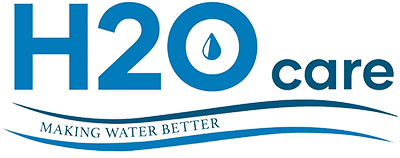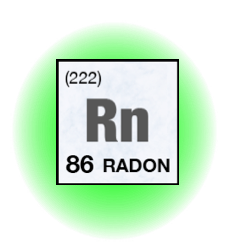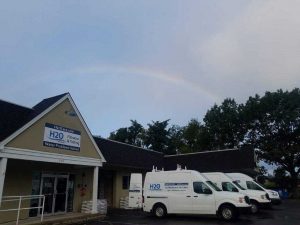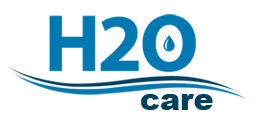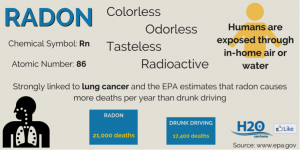
Radon in Water Solutions
Radon in water is not a problem until the gas escapes the water as it enters your home through faucets, showers, bathtubs and washing machines. As radon is a colorless, odorless, tasteless element, the need for a water test is all the more critical. Radon is a radioactive gas which comes from the natural decay of uranium found in nearly all soils. Accordingly, to remove radon in water, a properly designed system that agitates the radon gas out of the water then vents it safely outside is effective.
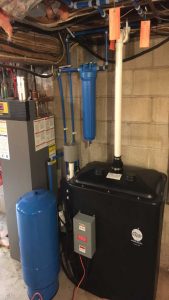
Radon in Water Removal
RADON IN WATER ACTION LEVELS (These may change)
Massachusetts = 10,000 pico curries/liter Environmental Protection Agency = 4,000 pico curries/liter
New Hampshire = 2,000 ” ” Maine = 4,000 ” ”
Rhode Island = 4,000 ” ”
Common sources of Radon in Water
1. Cracks in walls 2. Cracks in solid floors
3. Construction joints 4. Gaps in suspended floors
5. Gaps in service pipes 6. Spaces inside walls
7. In your water supply as gas is released into the air in the home.
RADON STUDIES, RISKS & OTHER CONCERNS
The Massachusetts Department of Public Health Radiation Control Program performed a 1988 study in conjunction with the EPA. In following, the data gathered from that study estimates that one out of four homes may have levels above the 4.0 Pico curries/L in air action level. However, the only way to know if your home has a problem is to have a test performed.
The increased risk of developing lung cancer from radon is directly related to the concentration of radon and the length of time that a person is exposed to it. Radon is a Class A carcinogen and the second leading cause of lung cancer. The U.S. Environmental Protection Agency (EPA) estimates that there are between 5,000 and 30,000 radon-related lung cancer deaths each year. Radon is the number one cause of lung cancer in non-smokers.
CIGARETTE SMOKING
Cigarette smokers have eight times the risk from radon as non-smokers. Therefore, cigarette smokers in particular, should keep their exposure to radon as low as possible. Importantly, if the home was tested in an infrequently used basement, it may have measured a radon level that is higher than the actual level you are exposed to, versus upstairs. Additionally, families with young children should be more concerned with the possible consequences of radon exposure 20 years from now than someone in their late sixties or seventies. Families with a hereditary predisposition of cancer should be more concerned about radon exposure than families who don’t have any history of cancer.
ACTIONABLE LEVELS OF RADON IN AIR
Although no level of radon in water or air is considered absolutely safe, the USEPA action level for radon is 4.0 picocuries per liter of AIR (pCi/L). (pCi/l= picocuries per liter, the most common method of reporting radon levels. A pico Curie is 0.000,000,000,001 (one-trillionth) of a Curie, an international measurement unit of radioactivity. One pCi/l means that in one liter of air there will be 2.2 radioactive disintegrations each minute. For example, at 4 pCi/l there will be approximately 12,672 radioactive disintegrations in one liter of air, during a 24-hour period.)
The risk of developing lung cancer at 4.0 pCi/L in AIR is estimated at about 7 lung cancer deaths per 1000 persons, which is why the USEPA and IEMA recommend reducing your radon level if the concentration is 4.0 pCi/L or more.
Testing for radon in water can be a little tricky. Importantly, there can be absolutely no air bubbles in the water sample container. Also, the sample should be tested within 24 hours of the time the sample was pulled. A water treatment professional can assist you in this process and also help you analyze the lab test results. For more on radon, see radon in water epa.
